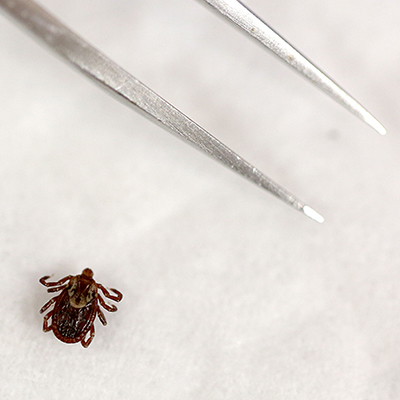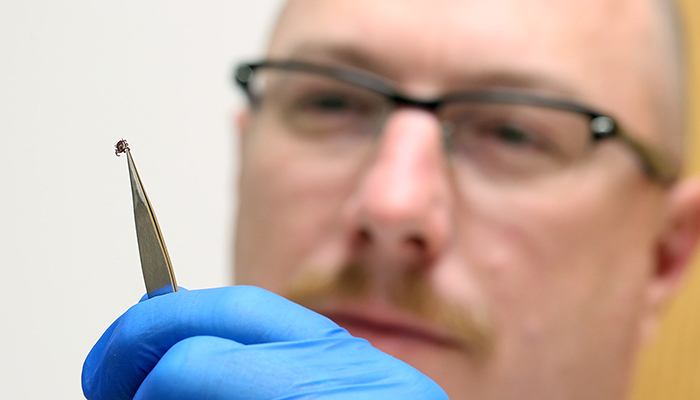Testing ticks by the hundreds
By Jan Jarvis
When it gets hot and muggy, ticks by the hundreds show up at UNT Health Science Center.
Fortunately they are all dead.
At the Tick-Borne Disease Research Laboratory, the small arachnids are analyzed and tested with the same DNA methodologies used in the Health Science Center’s cutting edge forensic genetics labs, said Dr. Michael Allen, the lab’s director.
 “Sometimes they are all mashed up to the point where they are unrecognizable,” said Dr. Allen, Associate Professor of Molecular and Medical Genetics. “But even then we can still identify the tick’s DNA.”
“Sometimes they are all mashed up to the point where they are unrecognizable,” said Dr. Allen, Associate Professor of Molecular and Medical Genetics. “But even then we can still identify the tick’s DNA.”
Year round but especially during the summer, hundreds of ticks taken off humans are delivered to UNT Health Science Center for analysis of disease causing-organisms, such as Borrelia and Rickettsia. While most ticks are merely annoyances, some can cause serious diseases.
“There are a lot of different species of ticks and each species carries different diseases,” Dr. Allen said. “We test for four common nasty bacteria.”
Deer ticks are known to transmit the bacteria that cause Lyme disease, a serious condition that is more common in Eastern states. Rocky Mountain spotted fever, caused by certain species of Rickettsia bacteria, can result in acute illness with a rash and high fever.
“If you get this from a tick, there’s a good chance it will kill you if it isn’t treated,” Dr. Allen said. “Left untreated, it has about a 30 percent mortality rate. Fortunately the disease responds well to common antibiotics when properly diagnosed.”
Any Texas resident can submit tick samples to the Texas Department of State Health Services, which then sends them to UNTHSC for free testing. Only specimens from a Texas address are covered under an agreement with the state. This also includes ticks picked up by Texans traveling elsewhere.
Tick samples also can be submitted directly to Dr. Allen’s lab, and will be tested for a fee. Out-of-state residents and people interested in having ticks tested from their pets can submit samples – also for a fee.
“If a Texas resident visited New York or California and picked up a tick there, we would still test it for free,” he said. “Information about the tick’s origin is important because regions present different levels of risk.”
During the summer when children go away to camp and people spend more time outdoors, it’s not uncommon to discover the tiny creatures crawling, or worse, sucking on their skin. That is when disease transmission poses the greater risk. A tick can feed for a week and be full for a year.
Once a tick attaches to the skin and starts sucking blood, the best defense is to quickly remove it and send the sample to the state.
“If a tick is found crawling on the skin it’s not a problem,” Dr. Allen said. “But the longer it stays on the skin the more likely it will bite and start feeding.
“You should use a tweezers and apply slow and steady pressure. Grab its head, pull it off as quickly as possible and then wash your hands. There’s no evidence that burning a tick does anything.”
Better yet, take a few precautions when in wooded areas. Use DEET, cover legs and arms and wear light-colored clothing that makes it easy to spot a tick before it bites.
“People shouldn’t stop going outdoors because of ticks,” Dr. Allen said. “They just need to pay attention.”




![Uyen Sa Nguyen Scaled[58]](https://www.unthsc.edu/newsroom/wp-content/uploads/sites/16/Uyen-Sa-Nguyen-scaled58-145x175.jpg)

Social media